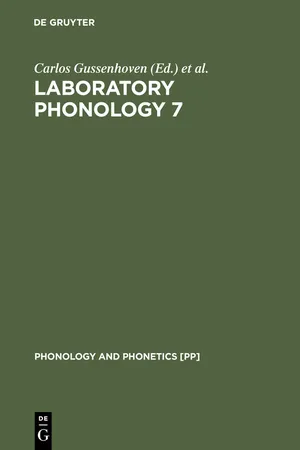
eBook - PDF
Laboratory Phonology 7
- 736 pages
- English
- PDF
- Available on iOS & Android
eBook - PDF
Laboratory Phonology 7
About this book
This collection of recent papers in Laboratory Phonology approaches phonological theory from several different empirical directions. Psycholinguistic research into the perception and production of speech has produced results that challenge current conceptions about phonological structure. Field work studies provide fresh insights into the structure of phonological features, and the phonology-phonetics interface is investigated in phonetic research involving both segments and prosody, while the role of underspecification is put to the test in automatic speech recognition.
Tools to learn more effectively

Saving Books

Keyword Search

Annotating Text

Listen to it instead
Information
Table of contents
- List of authors
- Acknowledgements
- Introduction
- Part 1: Phonological Processing and Encoding
- The role of the lemma in form variation
- Phonological encoding of single words: In search of the lost syllable
- Temporal distribution of interrogativity markers in Dutch: A perceptual study
- Phonological Encoding in speech production: Comments on Jurafsky et al., Schiller et al., and van Heuven & Haan
- Word-specific phonetics
- Phoneme frequency in spoken word reconstruction
- Temporal neutralization in Japanese
- A typological study of stress ‘deafness’
- Confluent talker- and listener-oriented forces in clear speech production
- Phonological Processing: Comments on Pierrehumbert, Moates et al., Kubozono, Peperkamp & Dupoux, and Bradlow
- Part 2: In the laboratory and in the field: relating phonetics and phonology
- Explosives, implosives and nonexplosives: The phonological function of air pressure differences in stops
- Assimilatory processes and aerodynamic factors
- Tonal association and target alignment in European Portuguese nuclear falls
- Gestural overlap and recoverability: Articulatory evidence from Georgian
- The Phonetics-Phonology Interface: Comments on Clements & Osu, Solé, Frota, and Chitoran et al.
- The search for primitives in phonology and the explanation of sound patterns: The contribution of fieldwork studies
- Acoustic correlates of rhythm class
- From pitch accent to stress accent in Basque
- Lexically contrastive stress accent and lexical tone in Ma’ya
- Field work and phonological theory: Comments on Demolin, Grabe & Low, Hualde et al., and Remijsen
- Underspecified recognition
- Speech recognition: Comments on Lahiri & Reetz
- Subject Index
- Author Index
- Language Index
Frequently asked questions
Yes, you can cancel anytime from the Subscription tab in your account settings on the Perlego website. Your subscription will stay active until the end of your current billing period. Learn how to cancel your subscription
No, books cannot be downloaded as external files, such as PDFs, for use outside of Perlego. However, you can download books within the Perlego app for offline reading on mobile or tablet. Learn how to download books offline
Perlego offers two plans: Essential and Complete
- Essential is ideal for learners and professionals who enjoy exploring a wide range of subjects. Access the Essential Library with 800,000+ trusted titles and best-sellers across business, personal growth, and the humanities. Includes unlimited reading time and Standard Read Aloud voice.
- Complete: Perfect for advanced learners and researchers needing full, unrestricted access. Unlock 1.4M+ books across hundreds of subjects, including academic and specialized titles. The Complete Plan also includes advanced features like Premium Read Aloud and Research Assistant.
We are an online textbook subscription service, where you can get access to an entire online library for less than the price of a single book per month. With over 1 million books across 990+ topics, we’ve got you covered! Learn about our mission
Look out for the read-aloud symbol on your next book to see if you can listen to it. The read-aloud tool reads text aloud for you, highlighting the text as it is being read. You can pause it, speed it up and slow it down. Learn more about Read Aloud
Yes! You can use the Perlego app on both iOS and Android devices to read anytime, anywhere — even offline. Perfect for commutes or when you’re on the go.
Please note we cannot support devices running on iOS 13 and Android 7 or earlier. Learn more about using the app
Please note we cannot support devices running on iOS 13 and Android 7 or earlier. Learn more about using the app
Yes, you can access Laboratory Phonology 7 by Carlos Gussenhoven, Natasha Warner, Carlos Gussenhoven,Natasha Warner in PDF and/or ePUB format, as well as other popular books in Languages & Linguistics & Linguistics. We have over one million books available in our catalogue for you to explore.